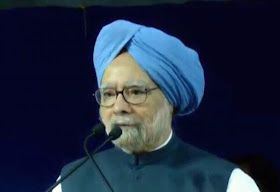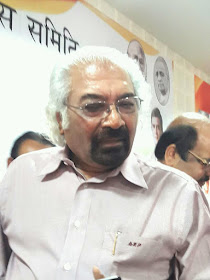It is dialogue versus demagoguery in Gujarat. It is soft civilized language versus shrill slogan shouting of a road side peddler of a male potency potion. It is direct one-to-one, two-way communication between politician and public versus one-way barrage of rabble rousing by a demi-god before his devotees.
The contest is between Rahul Gandhi, whom his opponents seek to deride by calling him ‘pappu’ (kiddo) and Prime Minister Narendra Modi who has earned the sobriquet of ‘Feku’ (Bluff master) from his detractors.

The battle ground is Gujarat where the Congress has been reduced to a shambles during the last 22 years of the Bharatiya Janata Party’s (BJP’s) unchallenged rule. The Congress is still licking its wound of defection of nearly one-fourth of its MLAs to BJP barely two months ago at the time of the Rajya Sabha elections when the dates, December 9 and 14, for the state assembly polls were announced.
For BJP, Modi is like a one-man army. He began addressing rallies much ahead of the announcement of the assembly election dates. In his official capacity as the prime minster, Modi has launched new projects envisaging investment of millions of rupees. At all his programmes, audience was mobilized using state transport buses and trucks requisitioned from contractors.
However, Modi’s rabble rousing speeches have failed to impress the audience, if a large number of people seen leaving the venue mid-way is any indication.
Then, Rahul Gandhi began his party’s election campaign in Gujarat. In the last one month, he has participated in ‘Gujarat Navsarjan Yatra’ in an open vehicle criss-crossing the state. He was denied permission to use an open automobile in the Saurashtra region on the pretext of being a security risk. Rahul outwitted the ruling party by riding a bullock cart, mixing freely with the crowd, sidestepping the black cat commandos.
People turned up in large numbers to see their ‘pappu’, who broke his security ring to dine in roadside dhaba. At some places, on noticing a sizeable number of youth, he even changed into jeans and t-shirt and posed with boys and girls and obliged them with selfie snapshots.
Rahul’s sterling performance was in Surat, a city known for its textiles and diamond industry which employ more than a million migrant labourers from across the country. He visited small and medium scale industrial units, disregarding the security concerns, chatted up with both owners and workers in an effort to know their working conditions and problems.
He followed this with an interaction with the representative of the local trade and industry in the evening. During the hour-long interaction, organized in an auditorium which was packed, Rahul gave a short ten-minute speech before throwing open the meeting for questions from the audience. “Main apse kuchh kahne nahi, aapke man ki baat sunane aaya hoon” (I have come here not to tell anything to you but to listen to you).
For forty five minutes, Rahul patiently heard representatives of different trade and industry associations and replied to them. There were some uncomfortable questions too from the audience. However, this did not make Rahul shirk and evasive. “Mujhe abhi bahut kuchh seekhna hai. Maine bahut galatiya ki hain, dheere dheere sudhar lunga” (I have still to learn many things. I have committed a lot of mistakes too. But I hope to rectify them in due course), he said.
Former Prime Minister Manmohan Singh too addressed a gathering of businessmen and industrialists in Ahmedabad who cheered him with applause every time he spoke about how ill-conceived and disastrous the demonetization and GST action was. At the end of his half-hour speech, Dr Singh received standing ovation.
At all these occasions of interaction between the Congress leaders and the public, state party leaders appealed to the party workers and sympathisers to refrain from using foul language against Prime Minister Modi, BJP president Amit Shah and other BJP leaders even on the face of provocation.
In a move aimed at striking a chord with the people of Gujarat, the Congress party sent Sam Pitroda, the pioneer of telecom revolution in the country, to draw up a ‘People’s Manifesto’ after holding a series of consultations with a spectrum of social groups representing women, youth, small and medium scale entrepreneurs, artisans, educationists.
“We need to work for the ‘down to up’ model of inclusive development instead of the top to bottom model”, he said. “A small number of the rich and powerful people have hijacked democracy the world over. India can provide an alternative model of development on the Gandhian principle of participatory and decentralised economy,” he added.
Pitroda, a Gujarati born in Titlagarh, a small town of western Odisha, had done his graduation from the MS University of Baroda. He expressed grave concern over gross commercialisation of education and it’s falling standards and stressed the need for government intervention to ensure good quality higher education at affordable cost.
By roping in Dr Manmohan Singh and Sam Pitroda and engage them in interaction with the people the Congress party has initiated a process of dialogue which both exposes the chicanery and demagoguery of the unchallenged dream merchant that Narendra Modi has proved himself to be.
—
*Senior Ahmedabad-based journalist
Courtesy: CounterView


